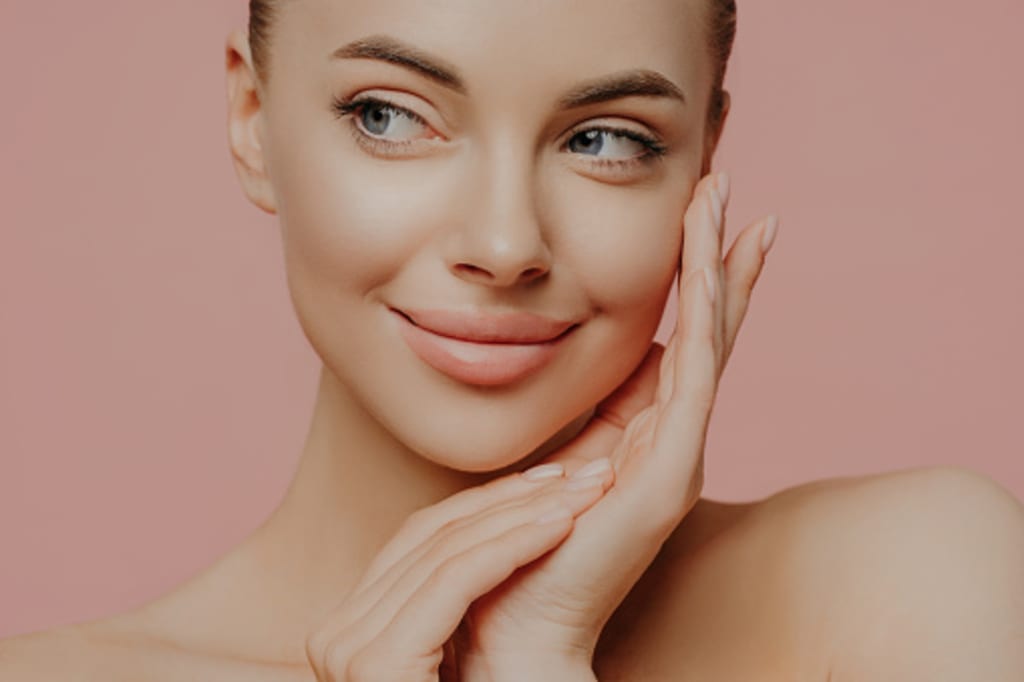
Sometimes it’s hard to know what your skin really needs to be as healthy as possible. Every day we’re bombarded by marketing hype for various skin care and cosmetic products, as well as advice from social media influencers and other
This article will help answer those questions by providing 8 evidence-based tips on what you can do to get the glowing complexion you want.
1. Hydrate
Drinking plenty of water and using a natural moisturizer can help keep your skin hydrated and prevent dryness.
Here are some tips to help you hydrate your skin:
1.Drink plenty of water: Aim to drink at least 8 glasses of water a day to keep your skin hydrated from the inside out.
2.Use a humidifier: Running a humidifier in your home or office can add moisture to the air, which can help prevent dry skin.
3.Use a gentle cleanser: Harsh soaps and cleansers can strip your skin of its natural oils, making it dry and dehydrated. Use a gentle, fragrance-free cleanser that is appropriate for your skin type.
4.Moisturize regularly: Apply a natural moisturizer to your skin twice a day, in the morning and at night, to keep it hydrated and prevent dryness. Look for a moisturizer that contains ingredients such as glycerin, hyaluronic acid, and aloe vera, which are known for their hydrating properties.
5.Exfoliate gently: Regular exfoliation can help remove dead skin cells and improve the absorption of moisturizer. Use a gentle exfoliant, such as a scrub made with sugar or salt, and exfoliate once or twice a week.
6.Avoid hot showers: Hot showers can strip your skin of its natural oils, making it dry and dehydrated. Use lukewarm water instead, and limit your showers to no longer than 10 minutes.
7.Avoid harsh ingredients: Ingredients such as alcohol, fragrances, and retinoids can be drying and irritating to the skin. Avoid using products that contain these ingredients, and opt for natural, fragrance-free products instead.
8.Apply a face mask: Face masks can help hydrate and nourish your skin. Look for masks that contain ingredients such as honey, avocado, and coconut oil, which are known for their hydrating properties.
Remember, everyone's skin is different, and what works for one person may not work for another. Be patient, and give your skin time to adjust to any changes you make. If you experience any irritation or dryness, reduce the frequency or intensity of your skincare routine, or switch to gentler products.
2.Eat a healthy diet
A diet rich in fruits, vegetables, and healthy fats can provide the nutrients your skin needs to look its best. Foods high in vitamins A and C, antioxidants, and omega-3 fatty acids are particularly beneficial for the skin.
Here are some tips on how to eat a healthy diet for your skin:
1.Include plenty of fruits and vegetables: A diet rich in colorful fruits and vegetables, such as berries, leafy greens, and sweet potatoes, can provide the vitamins, minerals, and antioxidants your skin needs to look its best.
2.Incorporate healthy fats: Foods high in healthy fats, such as avocado, salmon, and nuts, can help keep your skin hydrated and improve its texture and appearance.
3.Limit sugar and processed foods: Sugar and processed foods can trigger inflammation and contribute to skin problems, such as acne and wrinkles. Minimize your intake of these foods and opt for fresh, whole foods instead.
4.Drink green tea: Green tea is high in antioxidants and has been shown to protect the skin from damage caused by UV light and environmental stressors.
5.Increase your consumption of vitamins A and C: Vitamin A is important for maintaining healthy skin, and vitamin C is essential for producing collagen, a protein that gives your skin its structure and elasticity. Foods high in vitamin A include sweet potatoes, carrots, and leafy greens. Foods high in vitamin C include citrus fruits, strawberries, and bell peppers.
6.Get enough protein: Protein is important for skin health, as it helps to build and repair skin cells. Good sources of protein include lean meats, poultry, fish, and beans.
7.Stay hydrated: Drinking plenty of water can help keep your skin hydrated and flush out toxins. Aim to drink at least 8 glasses of water a day.
Remember, the key to healthy skin is a well-balanced diet that includes a variety of nutrient-dense foods. Avoid fad diets and extreme restrictions, as they can lead to nutrient deficiencies and harm your skin. If you have specific skin concerns, it may be helpful to speak with a dermatologist or a registered dietitian for personalized advice.
3.Get enough sleep
Lack of sleep can cause puffiness, dark circles, and dull skin. Aim for 7 to 8 hours of sleep each night.
Here are some tips on how to get enough sleep for healthy skin:
1.Establish a regular sleep schedule: Try to go to bed and wake up at the same time every day to help regulate your body's natural sleep cycle.
2.Create a relaxing bedtime routine: Turn off electronics and engage in relaxing activities, such as reading a book or taking a warm bath, to help you wind down before bed.
3.Make your sleeping environment comfortable: Keep your bedroom cool, quiet, and dark to create a relaxing and conducive sleep environment.
4.Avoid caffeine and alcohol before bed: Both caffeine and alcohol can disrupt your sleep and lead to restless nights. Avoid consuming these substances in the hours leading up to bedtime.
5.Get regular exercise: Regular physical activity can help you feel more relaxed and fall asleep more easily. However, avoid strenuous exercise close to bedtime, as it can make it more difficult to fall asleep.
6.Limit exposure to blue light: Electronic devices, such as phones, computers, and televisions, emit blue light, which can suppress the production of melatonin, a hormone that regulates sleep. Try to limit your exposure to blue light in the hours leading up to bedtime.
Remember, quality sleep is essential for overall health, and this includes the health of your skin. If you have trouble sleeping or if you experience persistent sleep problems, it may be helpful to speak with a healthcare professional for personalized advice and treatment options.
4.Reduce stress
Stress can cause skin problems, such as acne, eczema, and psoriasis. Try to reduce stress through activities such as meditation, exercise, and spending time with friends and family.
Reducing stress is important for overall health and well-being. Here are some tips to help reduce stress:
1.Mindfulness and meditation: Practice mindfulness and meditation to help calm your mind and reduce stress levels.
2.Time management: Prioritize your tasks and set realistic goals to reduce feelings of overwhelmed.
3.Social support: Connect with friends, family, or a support group to feel more connected and less isolated.
4.Relaxation techniques: Practice relaxation techniques such as deep breathing, progressive muscle relaxation, or yoga.
5.Healthy lifestyle: Maintain a healthy diet, get regular sleep, and engage in activities you enjoy to reduce stress and promote overall health.
6.Limit exposure to stressors: Reduce exposure to sources of stress such as negative news or difficult relationships.
5.Use natural skin care products
Avoid products that contain harsh chemicals and artificial ingredients, and opt for products made with natural, plant-based ingredients.
Using natural skin care products can benefit the skin and overall health. Here are some tips for using natural skin care products:
1.Read the ingredients list: Choose products with simple, recognizable ingredients and avoid synthetic additives such as fragrances and preservatives.
2.Choose organic: Look for products that are certified organic to ensure that they are free from harmful pesticides and chemicals.
3.Avoid harmful ingredients: Avoid ingredients such as parabens, phthalates, and sulfates, which have been linked to negative health effects.
4.Do a patch test: Before using a new product, do a patch test on a small area of skin to ensure that you do not have an allergic reaction.
5.Experiment: Natural skin care products can vary in effectiveness, so it may take some trial and error to find the right products for your skin.
6.DIY: Consider making your own skin care products using natural ingredients such as honey, aloe vera, and essential oils.
6.Exfoliate
Regularly exfoliating your skin can help remove dead skin cells and reveal a brighter, more radiant complexion. Use a gentle exfoliant, such as a scrub made with sugar or salt, and exfoliate once or twice a week.
Exfoliating is a process of removing dead skin cells from the surface of the skin to promote a brighter, smoother complexion.
Here are some tips for exfoliating:
1.Choose the right exfoliant: Choose an exfoliant that is appropriate for your skin type and avoid harsh scrubs that can damage the skin.
2.Don't over-exfoliate: Over-exfoliating can cause irritation and damage to the skin, so limit exfoliation to once or twice a week.
3.Be gentle: Use gentle, circular motions when exfoliating and avoid scrubbing too hard.
4.Follow with moisturizer: After exfoliating, use a moisturizer to hydrate the skin and protect it from further damage.
5.Pay attention to your skin: If you experience redness, irritation, or dryness after exfoliating, reduce the frequency or switch to a gentler exfoliant.
Exfoliating is an important step in any skincare routine, as it helps to remove dead skin cells and improve the overall texture and appearance of the skin. Just remember to be gentle and not over-exfoliate to avoid damaging the skin.
7.Use essential oils
Essential oils, such as tea tree, lavender, and rose, have natural antimicrobial and anti-inflammatory properties that can help improve the health and appearance of your skin.
Essential oils are highly concentrated plant extracts that can be used for a variety of purposes, including skincare.
Here are some tips for using essential oils:
1.Choose high-quality oils: Look for essential oils that are pure and of high quality, and avoid oils that are adulterated or contain synthetic fragrances.
2.Dilute before use: Essential oils are highly concentrated and should be diluted before use to prevent skin irritation.
3.Research the oil: Research the properties of the essential oil you want to use, as some oils may cause skin irritation or interact with medications.
4.patch test: Before using a new oil, do a patch test on a small area of skin to ensure that you do not have an allergic reaction.
5.Consult a professional: If you have a medical condition or are pregnant, it's important to consult with a professional before using essential oils.
6.Store properly: Store essential oils in a cool, dark place and keep the lid tightly closed to prevent oxidation.
Essential oils can offer a wide range of benefits for the skin, including hydration, soothing irritation, and reducing the appearance of fine lines and wrinkles. Just be sure to use them properly and with caution to avoid adverse effects.
8.Protect from sun damage
Wear a wide-brimmed hat and sunglasses, and apply a natural, mineral-based sunscreen with SPF 30 or higher every day to protect your skin from UV damage.
Protecting your skin from sun damage is important to prevent skin aging and skin cancer.
Here are some tips for protecting your skin from sun damage:
1.Wear sunscreen: Apply a broad-spectrum sunscreen with at least SPF 30 before going outdoors, even on cloudy days. Reapply every 2 hours and after swimming or sweating.
2.Seek shade: Limit exposure to direct sunlight, especially during the peak hours of 10am to 4pm, and seek shade when possible.
3.Wear protective clothing: Cover up with clothing, including a hat and sunglasses, to protect your skin from direct sun exposure.
4.Avoid tanning beds: Tanning beds emit harmful UV radiation that can cause skin damage and increase the risk of skin cancer.
5.Check your skin regularly: Conduct regular skin self-exams and schedule a dermatologist appointment if you notice any changes in your skin.
By taking these steps to protect your skin from sun damage, you can reduce your risk of skin aging and skin cancer, and maintain healthy, youthful-looking skin.






Comments
There are no comments for this story
Be the first to respond and start the conversation.